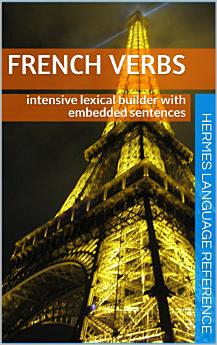French Verbs: intensive lexical builder with embedded sentences
About this ebook
This lexical builder is addressed mainly to beginner learners; however, intermediate learners could also profit from it, since the sentences are lexically rich and care has been taken to highlight numerous idiomatic expressions in which the common verbs take part, as well as their informal uses.
After the lexical builder, readers can further exercise their knowledge of verbs with a short story by Guy de Maupassant - ‘The Legion of Honour’/’ Décoré’ – published in 1883 and translated in English in 1903 by Albert M.C. McMaster.
The story is presented in a bilingual, juxta-paragraph translation – French sentences or phrases are immediately followed by translation.
Both Maupassant’s story and its the English translation, are now public domain. (https://en.wikisource.org/wiki/The_Complete_Short_Stories_of_Guy_de_Maupassant)
Ratings and reviews
About the author
[UPDATE Our free vocabulary trainer at http://hermestrainer.
Hermes Language Reference is the work of two PhD students in (ancient and German) philosophy, who, after facing the obvious reality that philosophy is not a very lucrative activity, thought they could put to some use their linguistic competence - they had to learn Latin, Ancient Greek (and a few other modern languages), the hard way, after they were already over 30 and language acquision is naturally slowed.
At the same time, the two would also feel rewarded if their experience and the e-books of Hermes Reference helped language learners to make some headway.
The principles they try to apply refer to:
1. Contextualised vocabulary
Most vocabulary builders on finds around (even when coming from prestigious publishing houses) present lists of words. Admittedly, sometimes they are arranged using categories, sometimes a handful of examples are also provided. But at bottom, these are word lists.
Instead, embedding vocabulary items in sentences appeals to the long terms memory because it is functionally superior – memory retains new content more deeply, to the degree to which this new content is linked to feeling and understanding.
2. Bilingual format, split in sentences or phrases
It is advisable in the preliminary stages to work with bilingual texts – if possible, having one sentence in the target language followed by the translation in the home language.
What is thereby avoided – the ‘evidence-based’ tendency of manuals for exclusive ‘language immersion’.
The ‘evidence’ in question looks at how children learn (new) languages. But not all language learners are children…Increasing language immersion is recommended, but towards the final stages of the process.
3. Grammar – not too much, not too little
What is thereby avoided – on the one hand, the related tendency of many modern manuals to ignore grammar or pay very little attention to it, on the other hand, the scholastic presentation of ‘serious’ methods, which go into such details that grammar acquision looks like an endless, life-time process.
Some grammars for Greek and Latin look like a joke – one would need decades to really assimilate them (let alone read them). In modern languages, the opposite tendency is to give grammar very little space (in conjunction with the abovementioned ethos of ‘immersion’). But arguably, this ignores the fact that, except children, most learners are in need of logical structures to ‘mould’ the lexical content.
4. Read what interests you
If one has the choice of reading a (bilingual) text already known (having been read in the native language) but boring, and reading a (bilingual) text that is not already known but looks exciting, one should pick out the latter option and not the former.
¤¤¤It might be that these principles reflect the methodology of mature learners, as we have been ourselves
Please e-mail us at hermeslanguagereference@gmail.
https://
---------------------
Hermes Language Reference réunit le travail de deux doctorants en philosophie ancienne, qui, après avoir fait l'expérience de la manque d'efficacité de la philosophie sur le plan financier, ont cru pouvoir utiliser leur compétences linguistiques (grec ancien et latin, mais aussi quelques langues modernes) afin d'aider d'autres apprenants en langues. N'hésitez pas à nous contacter à l'adresse hermeslanguagereference@gmail.
https://






